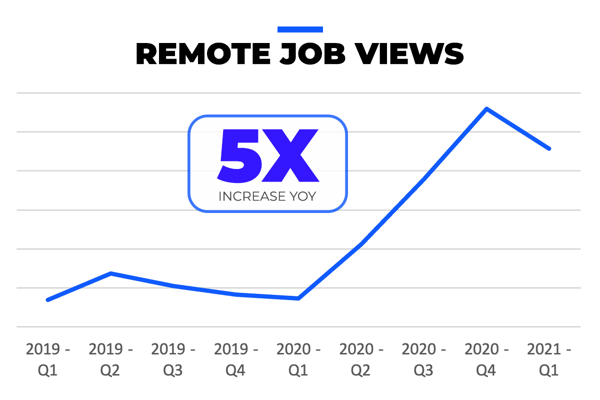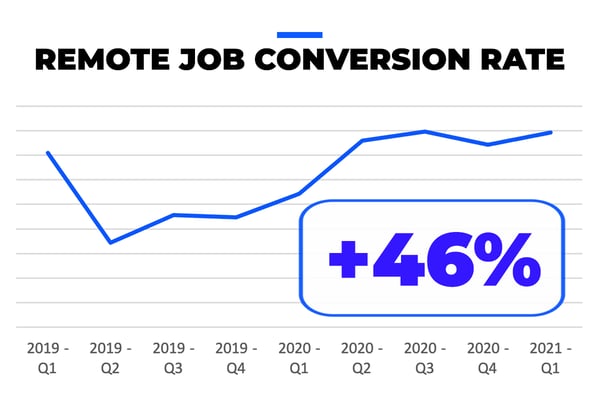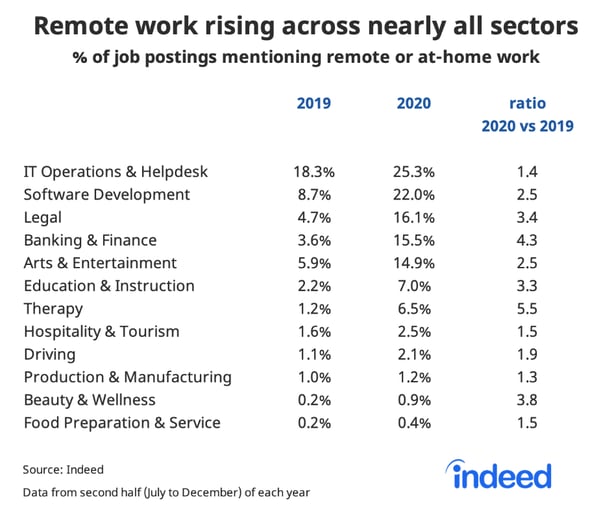More opportunities for remote work are here to stay. The COVID-19 pandemic necessitated that many employers be more flexible about where and how work was done. Now, changes in work behavior and searches performed by those in the job market have accelerated these temporary accommodations into a more permanent reality.
Remote Job Growth
For several years now, companies have slowly been adopting remote work as part of their business functions, so the trend itself is not new -- but its permanence is. When the world shut down for the pandemic, the only way some businesses could safely continue to operate was to allow their employees to work remotely. Under rapidly mounting pressure, companies figured out how to do it rather quickly. The efficiency and flexibility in these changes also created a shift in how job seekers search for jobs.
At the beginning of 2021, there were seven times more remote job views compared to early 2020, according to Recruitics analytics. Over that same period, the average conversion rate for remote jobs improved by 46%.
Additionally, Google search trends for the term “Remote Jobs” continue to remain high, hitting a peak in January and February 2021, despite the fact that job seeker search trends for jobs in general has declined.
Now, we’re past the point of no return. Companies may have to consider keeping remote work as an option in some shape or form to remain competitive and appeal to the new expectations of talent.

Source: Recruitics Analytics

Source: Recruitics Analytics
What does this mean for employers? It’s different for every company, but there should be conscientious thought put into exploring how they can incorporate remote work in some way, shape, or form. Signs are showing that for industries that lend themselves to remote work, there will be an increase in job demand. For those that don’t, there may be more competition in the market than in previous years.
The share of job postings mentioning “remote work,” “working from home,” or related terms more than doubled since January last year, according to Indeed. Additionally, in February 2021, nearly 7% of all job postings in the U.S. on Indeed were remote. In January 2020, only about 3% were.
In order to remain competitive and attract top talent, it’s important to determine what your company is willing to do in response to the shift in the searches job seekers are performing and the benefits they are shown to desire most. Will you continue or increase remote job opportunities? How else will you increase worker flexibility?

Work From Home Benefits: For Employees And Employers
Though it may not be the traditional way of working, it’s important to note that there are many benefits to companies who are considering or increasing remote work.
For example, they can hire the best talent from anywhere. When proximity to an office doesn’t matter, your potential talent pool expands exponentially. This is especially useful for companies who have tapped out their local market for talent. You can hire more employees who are the right fit from anywhere in the world.
Additionally, with remote work comes less commute time, which improves employee morale. Many employees appreciate working from home because they aren't worn out by a long commute, so they are fresh and ready when starting work. Commuting each day is costly, and working from home allows workers to save on commuting costs. Also, not having to begin and end the day fighting traffic allows for flexibility in other areas of life. This helps employees have more time to devote to wellness and their families, which helps them maintain an ideal work/life balance. Companies can retain employees who need flexible schedules.
Another benefit is increased productivity. During the course of the pandemic, many employers have found they received more benefit, in terms of output and efficiency, from their employees. With the reopening of daycare and schools, these same employees may have less distractions and more ability to focus at home than in the office. They are also typically in the comfort of their own homes or another familiar space, which means there is less time involved in getting settled or resettled when they engage with their work. If working remotely, they also have the opportunity to work from anywhere, which means if they do need to be in another location for a few days, they don't have to take that time off.
Financial savings on real estate is also beneficial for companies. For many businesses, working in or around a city can be financially difficult when paying rent or mortgages. If companies shift to working remotely, the cost of holdings through rent or mortgage, upkeep and maintenance, etc. will be diminished or eliminated. Or, companies can acquire a smaller office space and save that way.
Compensation and benefits can also be adjusted. While employees work remotely, this means that many benefits employers were giving to employees aren’t necessary anymore. This can be from compensation for miles driven, to commute programs for public transportation or ride sharing, to even keeping fully stocked snacks in the office. This doesn’t mean you should stop showing appreciation to your employees, but now funds aren’t needed for transport or keeping the office stocked and can be used in different areas.
What's Next?
When you hire the best talent and make them feel their best, they will do their best work. If that means remote opportunities, every company now knows how to make that happen after this year and can begin to implement these changes.
If your company is looking to adopt remote work options, there are several things you can do to prepare. It’s important to establish remote work guidelines and training ahead of time. This allows for employees to know their expectations, outline deadlines, and ensures productivity. Having daily check-ins are also beneficial, so there is structure in the day and daily expectations are discussed. This also allows time for employees to consult with their managers and ensure there’s collaboration. Having different communication technologies is a great way for employees to interact with each other on their desired platform. You can only do so much through emails, so having other outlets to communicate on allows for clear communication, more personal interactions, and helps with isolation.
When piloting a remote environment, make sure you have a way to track progress to make the employee stay accountable for their work. It also helps to do a test trial to see what issues arise and if policies need to be adjusted before implementing it company-wide.
--
While we know that demand for talent has increased significantly with a rise in new job postings, and that the talent supply is declining, it’s important now more than ever to remain competitive. This is especially true because 72% of talent professionals are saying that work flexibility, including remote work options, will be important for the future of recruiting.
In the meantime, if your company is looking for help to enhance your employer brand after a year full of change, contact Recruitics!



